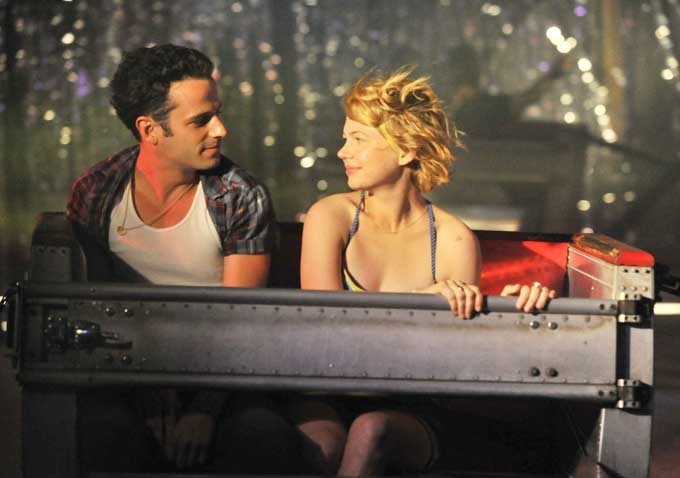Due to the alcoholic subtext of
Another Year, as I'd read in various reviews about its characters who deal with addictive tendencies (a subject I'm prone to take obsessive interest in), I've wanted to see it since it hit theaters last year. However, I've also been a little fearful of the film because I'm no fan of Mike Leigh, the UK writer/director who never seems to realize the outrageous potential of cinema, and maybe should have worked his sullen dramas in theater instead.*
I'm not saying Leigh's films are boring... Well, OK, to be honest, I guess I am.
I do enjoy films in which character study is the most important aspect, but for some reason Leigh's other well-known films --
Secrets and Lies,
All or Nothing and
Vera Drake -- are the kinds where you view them and you might remember them in a week, but certainly not in a month. Case in point: I remember talking about
Vera Drake with quite a few people way back when, but I have no memory of anything we discussed outside its controversial subject matter, and frankly, it wasn't strong enough to care to go back for another look.
So there is is. I find Mike Leigh films a bit of a bore. I've admitted my bias up front, and I'm willing to be taken to task for my failure. (There are circles, in Britain, where the guy is held up as a god with a small "g".)
I finally sat with
Another Year when my friends at
A&F began the nominating process for a list that will eventually become the Top 25 Films About Marriage, or whatever we finally call it. I am voting in that poll and want to give the many nominations their fair shake -- meaning, I want to see as many nominees as I can and follow in the discussions about
why a particular film might qualify as a top film on the complexities of marriage. And I can see a decent case being made for
Another Year. It is definitely a film which would suit that list quite well. The problem I'm having with it is more of the "boring" and less of the "well suited."
The film might be as boring as some of the marriages I've seen, but I found something interesting when engaging its reviews, one thing that might make Leigh a genius and prove that I honestly don't know what I'm even talking about. To get to that, let me first explain the foundation of
Another Year's plot:
The story follows a happily married couple in North London, Tom and Gerri, and a year in their family and friends' lives. The year is divided into four seasons, beginning with Spring and ending in Winter. The couple is aging, but both are still working -- Gerri as a therapist, a counselor of some sort, and Tom as a very professional city engineer, which he shrugs off as being a guy who "digs holes." They are both white collar, educated, with a big house and quite a few rooms and are happy in their various roles in the marriage. They have a son in his late twenties or early thirties, Joe, who hasn't yet found the right girl (and doesn't share much with them about this part of his life), and a few friends who seem to stay over and drink too much at their house from time to time.
One of the friends is Mary, perhaps one of the neediest characters I've seen in a while. She is single, in her early forties, and says she's happy until the drink has finally excited her tongue a bit, and that's when you find out, oh, she's not so happy about being single after all. After she's been drinking a few times at their house you start to look at her a little differently. One might say she's pathetic, but you can also form feelings of sympathy for her loneliness. It's not every single person's fault that they are alone. Mary has made some sad choices over the years, sure. But the choices don't seem wrong enough to alienate her. That's just a part of her life. That's a part of her character's fate. Hence the sympathy.
A few of the characters here are interesting to watch, Mary being the first and foremost. It seems she might fall for any man to dig herself out of her isolation. But that's not quite true. There's another fellow who stays over at Tom and Gerri's place sometimes too -- Ken -- an overweight and aging smoker and drinker, another divorcee who also drops in at the house, stays over, and cries a little bit when he's drunk, too. Though Mary never sees Ken cry, she treats him with contempt. It's hard to say whether there was some sort of past that hangs between them. Mary, too old for Joe, keeps feasting her eyes on him, and when she runs into Ken, who
might be a decent fit, she treats him like the plague.
If you like a character-driven drama and a story that simply watches how folks interact in the real world,
Another Year can be worth your while. But for me, Leigh's genius came after the film (which I still admit is a little long winded for my own tastes), when I read about the characters and how different viewers reacted to them. This is where we look at Tom and Gerri a little differently, and begin to see that we don't always have the same perceptions about the people we meet; that our backgrounds and understanding shape our perceptions about people as much as much as their own actions.
Recently, after sitting once again with the beautiful six-hour epic
The Best of Youth, I wrote a bit about how two characters can be involved in the same situation and can be moved in opposite life directions, polar extremes from one another -- but we still understand both characters and why they would choose their separate paths, even though they've been through the same ordeal.
The same can be said about alternate viewers' reactions to
Another Year. Case in point: My long time A&F friend and
WAFCA critic, Christian Hamaker, wrote the following about Tom and Gerri after seeing
Another Year:
The married couple around whom the story revolves are wonderful people, imperfect but kind-hearted and generous. People come to them with their worries and fears, with good news and bad. And the couple reaches out to others who are hurting, who are newly widowed. They take care of their family, and their friends.
Christian goes on to say that it is so simple and obvious, and yet amazing.
I had the same sort of interpretation of Tom and Gerri (minus the word "amazing," for I don't know whether he is talking about the couple in the film or the film itself). That basically, Tom and Gerri are nice. That there really are courteous people left in the world, and that the film displays an example of that notion in this couple. Here are two people who have grown together, and from their love, which is really the driving force of the film, they feel compelled to reach out to their friends, except when their friends get in the way of their family (and essentially, that happens in Mary's later reaction to Joe bringing home a real girlfriend).
How interesting, then, to read a few other critics' reactions, and I'll just note here that this is re-printed from the same forum:
Karina Longworth, The Village Voice:Unfolding in four episodes pegged to the seasons, Another Year’s arc covers the widening gulf between Tom and Gerri’s entitled contentment, and the increasingly bleak desperation of their family and friends. Ken and Mary, envious of Tom and Gerri’s bond to one another, seem to regard the couple’s home as a safe space in which to unload—apparently oblivious to the knowing looks that Tom and Gerri exchange right in front of them. The further the characters are etched, the harder it becomes to figure out with whom Leigh intends us to identify: Tom and Gerri’s horrible house guests, who you can’t help but pity for their clueless concern for only themselves? Or self-appointed “Saint Gerri” and her even more self-righteous partner, whose care for friends and family is never anything less than condescending?
Glenn Kenny, MSN Film Reviewer:Tom and Jerri are cheery, comfortable old lefties who've understood that they're not in a position to change the world anymore, and have gotten to be fine with that -- there's a correlation between this picture and Leigh's 1988 "High Hopes," in which a younger (obviously), punkier, leather-jacketed Sheen played one half of far a more agitated couple in Thatcherite Britain. As for Mary, her life is one (largely invented) turmoil after another, and the couple's dealings with her frantic plaints eventually get the viewer to wondering whether these nice, settled folks are really all that nice. Mary is very clearly an alcoholic. But the A-word is never once dropped in the film. And Jerri, who's a therapist herself, never even suggests counseling, or a support group, to Mary until an almost cruel hammer-dropping scene near the film's end. Tom and Jerri are so very polite, so very indulgent, so very correct in all their dealings, all the while dispensing conventional left-liberal wisdom spiked with conventional complacent cynicism whenever contemplating a crisis, be it global or local. But it's clear that all the while, they're stifling their own strong feelings of put-upon-ness and resentment. As much as you like them -- and maybe you won't like them, (that's one of the things about Leigh's films and their characters, they're so unusually and thoroughly textured that they never seem designed to elicit a simple response) -- you have to wonder if they're so besotted by their own comfort and contentment that they can't help but act as passive-aggressive near-monsters to the people they're supposedly close to.
I guess this is one long blog post simply to say that I'm still learning, and that one can learn even from a movie that he considers slightly "boring." I'm learning about the power of perspective, still learning that there is never one absolutely right path. I'm learning that we all see things from our own (mostly wrong) backgrounds and senses of personal taste, but the human nature in every one of us needs to form some kind of an opinion anyway -- if anything, so that we just don't float and get pushed around.
I'm gonna chalk this one up as a film which didn't really bother me, but it didn't really move me, either. But its reviews and criticism gave me a bit to chew on, so it can't be as bad or boring as I originally thought.
And if ever I talk about Mike Leigh again, I'm going to try my best to not give an opinion in a sentence or two. Clearly there is a lot of craft at work here, to be able to evoke such strong, opposite reactions from well-known critics.
Is Leigh a genius? Tough to say. But he wouldn't be the first genius I don't really connect with all that well.
* That is not to discredit theater, although that's not my thing either, but it is foolish to not realize that film has more tools available with which to enchant the viewer.









